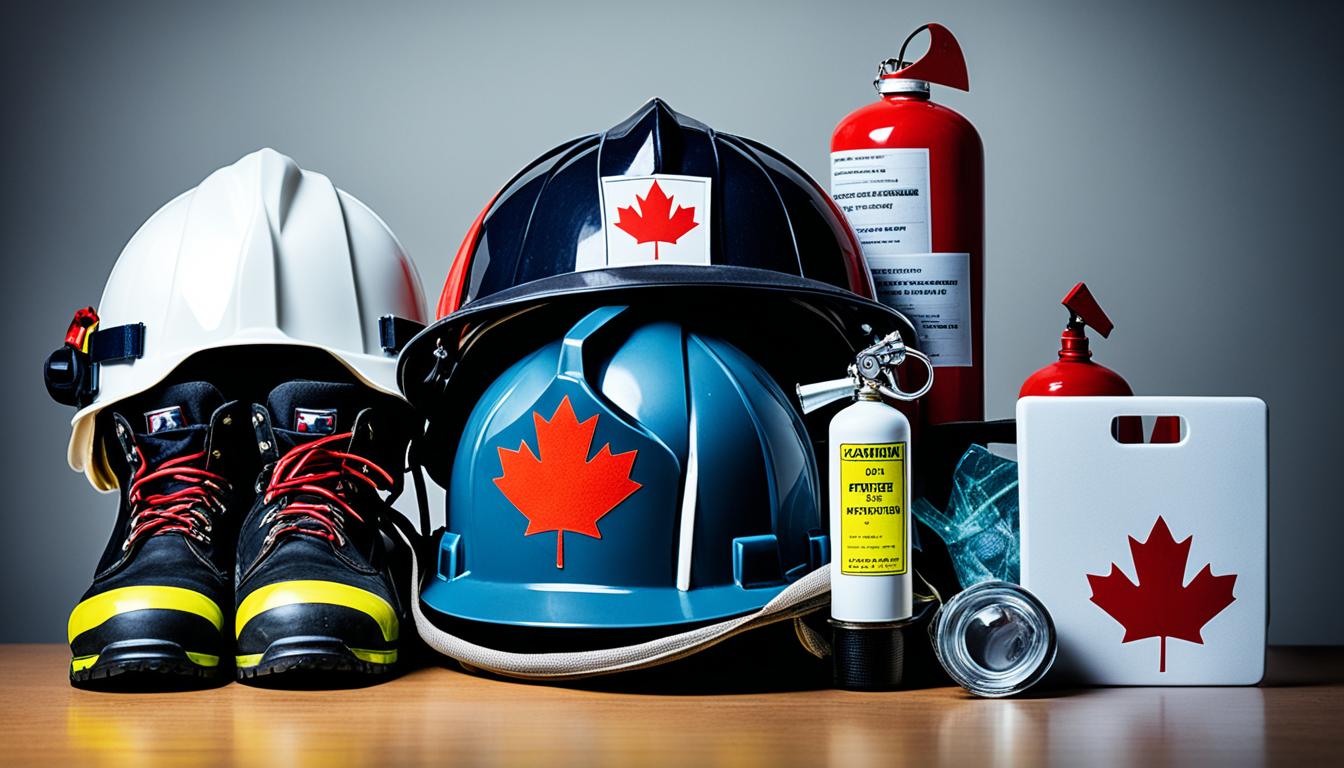Are you someone who has always been attracted to the thrill of helping others in times of crisis? Do you have a burning desire to make a difference in your community? If so, a career as a firefighter in Ontario might just be the perfect fit for you. The role of a firefighter is not only demanding but also highly rewarding, as you will have the opportunity to save lives, protect property, and be a hero in the eyes of those you serve. But how do you become a firefighter in Ontario?
What are the requirements, and how hard is it to get into this noble profession? In this article, we will explore all these questions and more, providing you with a comprehensive guide on how to become a firefighter in Ontario. So, if you’ve been wondering about the steps to follow, the qualifications needed, and the earning potential, keep reading to find out.
Eligibility and Minimum Requirements
To become a firefighter in Ontario, there are several essential eligibility and minimum requirements that applicants must meet. These include being at least 18 years of age, legally entitled to work in Canada as a citizen or permanent resident, and free of any criminal convictions for which a pardon has not been granted.
1. Age and Legal Status
Aspiring firefighters in Ontario must be at least 18 years old at the time of application and legally authorized to work for any employer in Canada. This means they must either be Canadian citizens or permanent residents.
2. Educational Qualifications
Applicants for firefighter positions in Ontario must possess an Ontario Secondary School Diploma (OSSD) or an academic equivalent. This high school-level education is a fundamental requirement to ensure firefighters have the necessary literacy, numeracy, and problem-solving skills to perform their duties effectively.
3. Language and Communication Skills
Excellent communication skills are essential for firefighters in Ontario. Candidates must demonstrate the ability to speak, read, and write English fluently, and communicate clearly and precisely, even under demanding and high-pressure situations.
4. First Aid and CPR Certification
Aspiring firefighters in Ontario must have a valid Standard First Aid certificate and a CPR level HCP (for Health Care Providers) certification that is no more than 12 months old. These certifications must be maintained current within 12 months throughout the recruitment and selection process.
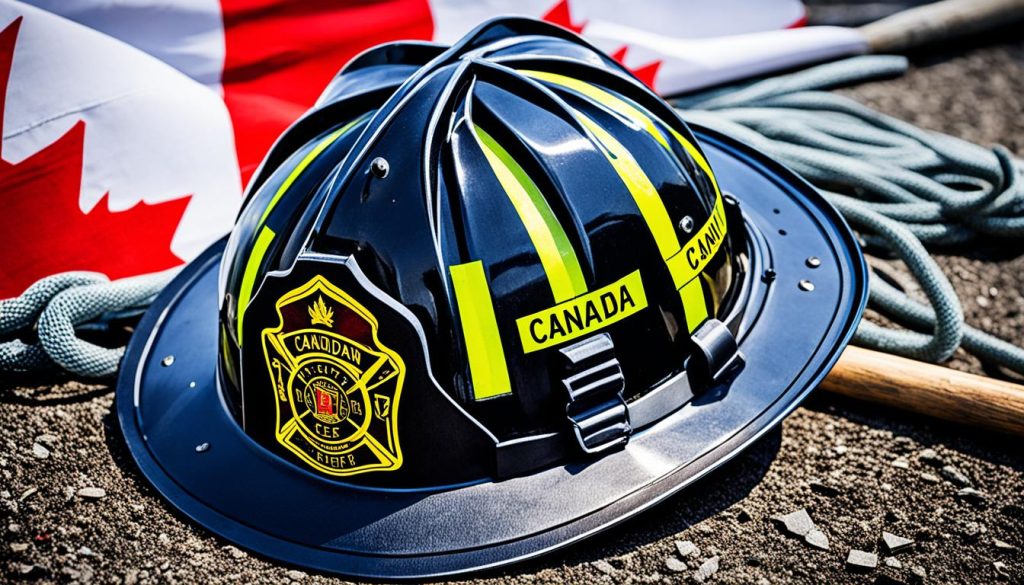
Licenses and Certificates
While the minimum requirements to become a firefighter in Ontario include having the necessary educational qualifications and certifications, municipalities may also require additional licenses and certificates. These can include a Pre-Service Fire Fighter Education & Training Program Certification, NFPA 1001 Fire Fighter I & II certification from an accredited program, or completion of the OFM curriculum components 1, 2, and 3 with an examination certificate. Applicants may also need a valid unrestricted Ontario Class “G” Driver’s License, with eligibility depending on having no more than two infractions (maximum of one moving and one non-moving conviction). Some municipalities may also require an Ontario “D-Z” driver’s license.
1. NFPA 1001 Firefighter I & II Certification
Firefighter services in Ontario have begun implementing NFPA standards to standardize training for all new recruits. This means that applicants need both their NFPA 1001 Firefighter Level I & II and NFPA 1072 Hazmat Awareness & Hazmat Operations certificates. These certificates are obtained once and never expire.
2. Driver’s License Requirements
Applicants may also need a valid unrestricted Ontario Class “G” Driver’s License, with eligibility depending on having no more than two infractions (maximum of one moving and one non-moving conviction). Some municipalities may also require an Ontario “D-Z” driver’s license.
3. OFAI Candidate Testing Services
Successful completion of all Stages (1-3) of the OFAI Candidate Testing Services (as verified by possession of a CTS Certificate) is required prior to the date of application submission.
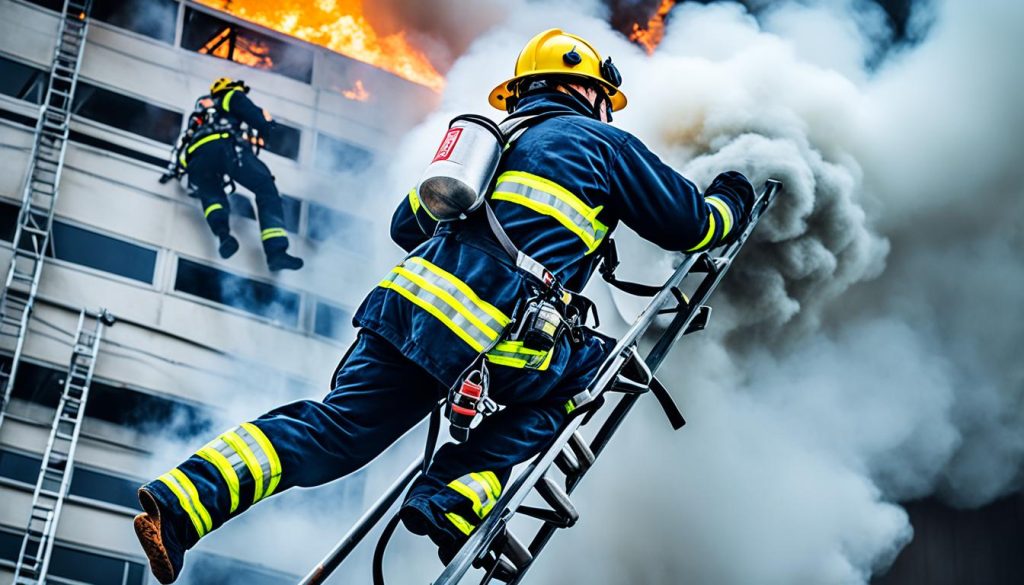
How to Become a Firefighter in Ontario?
Becoming a firefighter in Ontario requires more than just meeting the minimum eligibility requirements. Applicants must demonstrate their physical abilities and medical fitness to handle the demanding duties of the role. Additionally, the shift work and availability requirements are crucial considerations for those seeking a career in the Ontario fire service.
Physical Abilities and Medical Fitness
Applicants to a career firefighter position within the Ontario fire service are required to complete a series of tests to be considered eligible to perform safely and competently as a firefighter. These tests may include aptitude and interpersonal skills tests, vision and hearing screening, physical (clinical) testing, and some form of technical skills testing. Applicants offered a position or conditional offer of employment may be required to undergo a medical exam to ensure they are physically and medically fit for the demands of the job.
Shift Work and Availability
Firefighters in Ontario are expected to be physically fit to handle the sustained, intense, physical effort often required to perform their duties. They must be able to work at heights, inside confined spaces, and wear and use supplied safety equipment. Firefighters also work an assigned shift averaging 42 hours per week over a four-week period, including weekends and holidays.
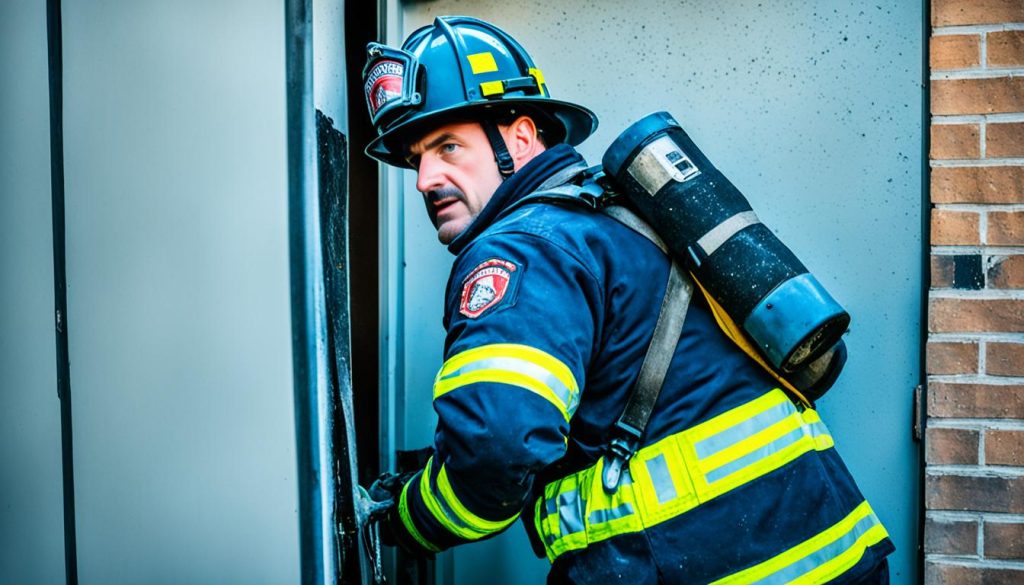
Valuable Assets and Additional Qualifications
While the minimum requirements to become a firefighter in Ontario include the essential qualifications, there are also additional assets and qualifications that can make an applicant more competitive. These include completion of higher-level EMS First Aid and/or medical training, a minimum of one year of prior full-time work experience in fire suppression, construction, trades, mechanical, emergency medical, large vehicle operation, or fire prevention-related fields, fluency in a second language or sign language, and community service involvement.
1. Advanced Medical Training
Acquiring a higher level of medical training, such as becoming an Emergency Medical Responder (EMR), can enhance an applicant’s chances of becoming a firefighter in Ontario. This advanced training can provide firefighters with the necessary skills to respond effectively to medical emergencies and improve patient outcomes.
2. Relevant Work Experience
Gaining relevant work experience, whether in fire suppression, construction, trades, or emergency medical fields, can be a valuable asset for those aspiring to become firefighters in Ontario. This prior experience demonstrates a candidate’s familiarity with the demands and challenges of the job, making them a more attractive and qualified applicant.
3. Community Involvement
Becoming involved in the local community, through volunteer work or other civic engagement, can also be a positive addition to a firefighter’s résumé. This type of involvement showcases an applicant’s dedication to serving others and their commitment to making a difference in their community.
4. Language Skills
Proficiency in a second language, such as French or sign language, can be an advantageous skill for firefighters in Ontario. This ability to communicate with a diverse range of individuals can enhance a firefighter’s effectiveness and their ability to provide the best possible service to the community.
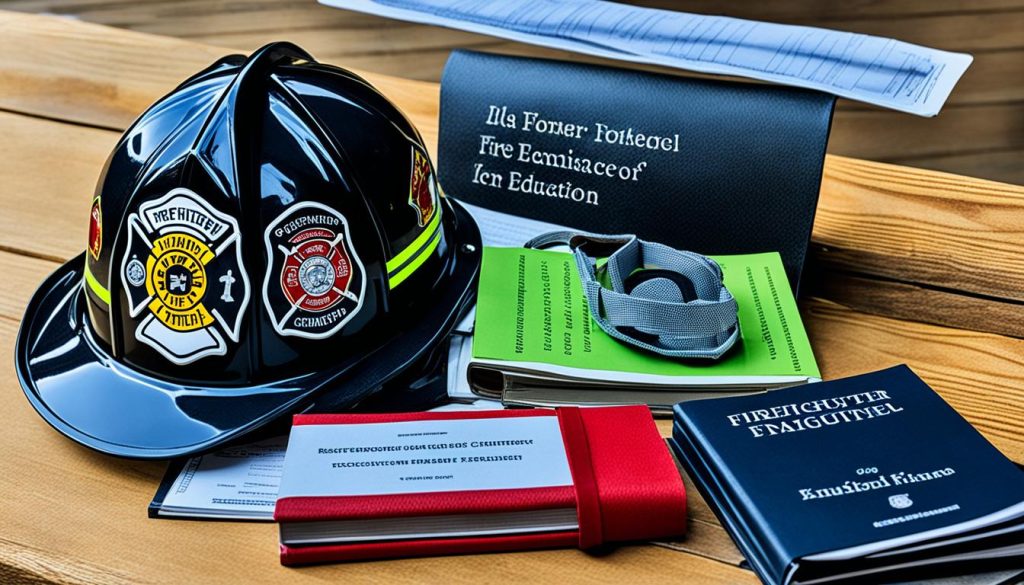
Application and Hiring Process
The path to becoming a firefighter in Ontario involves navigating a comprehensive application and hiring process.
Aspiring firefighters must first submit an online application, which may require providing documented proof of their educational qualifications, a current criminal reference check, a driver’s abstract, and evidence of vaccinations. Successful applicants will then progress to a series of assessments, including written and physical tests, as well as thorough background checks and a medical examination.
1. Online Application
The initial step in the hiring process is the online application. Applicants must ensure that all required information and supporting documentation is submitted accurately and on time. Falsifying credentials or misrepresenting oneself will result in the permanent closure of the application file.
2. Written and Physical Assessments
Once the application is approved, candidates will undergo a rigorous assessment process. This may include a Firefighter Aptitude and Character Test, Hearing Assessment, Vision Assessment, Encapsulated Treadmill Test, and Firefighter Physical Aptitude Job-Related Test, as mandated by the Ontario Fire Administration Inc. (OFAI).
3. Background Checks
In addition to the written and physical assessments, prospective firefighters in Ontario will also undergo comprehensive background checks. This scrutiny helps ensure the integrity and trustworthiness of the individuals seeking to join the fire service.
4. Medical Examination
The final step in the application and hiring process is a thorough medical examination. Applicants must demonstrate that they are physically and medically fit to handle the demanding requirements of the firefighter role, which often involves strenuous physical effort and the ability to work in challenging environments.
Training and Career Progression
Becoming a firefighter in Ontario involves comprehensive training and ongoing professional development to ensure the highest standards of service. Successful applicants who are offered a position or conditional offer of employment will be required to complete a thorough Recruit Training Program, which may include not only the Operations Firefighter Recruit Training but also Fire Prevention Training.
1. Recruit Training Program
The Recruit Training Program for aspiring firefighters in Ontario is designed to prepare them for the demands of the job. This intensive training program covers a wide range of topics, including firefighter training ontario, fire suppression techniques, emergency medical response, and hazardous materials handling. Recruits must also complete the NFPA 1001 Firefighter I & II certification, a widely recognized industry standard.
2. Fire Prevention Training
In addition to the Recruit Training Program, firefighters in Ontario are also required to undergo firefighter education ontario in fire prevention. This includes completing NFPA Level 1031 Level 1 and 1035 Level 1 training, which covers essential skills in fire inspection, investigation, and public education. This specialized training ensures that firefighters can contribute to proactive fire safety measures within their communities.
3. Ongoing Professional Development
Even after completing the Recruit Training Program and Fire Prevention Training, firefighters in Ontario are expected to participate in ongoing professional development to maintain a high standard of professionalism, integrity, reliability, and credibility. This may involve attending workshops, seminars, or specialized courses to stay up-to-date with the latest firefighting techniques, equipment, and safety protocols. By continuously enhancing their skills and knowledge, firefighters can ensure they are well-equipped to handle the dynamic and challenging nature of their how long does it take to become a firefighter in canada?
Conclusion
Becoming a firefighter in Ontario is a rewarding and challenging career choice that requires meeting specific eligibility and minimum requirements, as well as obtaining various licenses and certifications. The application and hiring process involves a series of assessments, background checks, and a medical examination, and successful applicants must complete a comprehensive Recruit Training Program and Fire Prevention Training.
With the right qualifications, physical abilities, and commitment to ongoing professional development, individuals can embark on a fulfilling career as a firefighter in Ontario, serving their community and making a meaningful difference. Whether aspiring to join the fire department or exploring career options, understanding the steps to becoming a firefighter in Ontario is crucial for those interested in this rewarding profession.
The journey to becoming a firefighter in Ontario may be challenging, but with dedication and the right preparation, individuals can position themselves for success in this esteemed field. By meeting the eligibility requirements, obtaining the necessary licenses and certifications, and navigating the application and hiring process, aspiring firefighters can take the first steps towards a career that offers the opportunity to make a lasting impact on their community.
FAQ
1. What are the minimum requirements to become a firefighter in Ontario?
The minimum requirements to become a firefighter in Ontario include being at least 18 years of age, legally entitled to work in Canada (either a citizen or permanent resident), and free of any criminal convictions for which a pardon has not been granted. Applicants must possess an Ontario Secondary School Diploma (OSSD) or academic equivalent, demonstrate the ability to work on rotating shifts, speak, read, and write English fluently, and have a valid Standard First Aid certificate and a CPR level HCP (for Health Care Providers) certification that is no more than 12 months old.
2. What additional licenses and certificates are required to become a firefighter in Ontario?
In addition to the minimum requirements, municipalities may also require a Pre-Service Fire Fighter Education & Training Program Certification, NFPA 1001 Fire Fighter I & II certification from an accredited program, or completion of the OFM curriculum components 1, 2, and 3 with an examination certificate. Applicants may also need a valid unrestricted Ontario Class “G” Driver’s License, and some municipalities may require an Ontario “D-Z” driver’s license.
3. What are the physical and medical requirements to become a firefighter in Ontario?
Firefighters in Ontario must be physically fit to handle the sustained, intense, physical effort often required to perform their duties. They must be able to work at heights, inside confined spaces, and wear and use supplied safety equipment. Firefighters also work an assigned shift averaging 42 hours per week over a four-week period, including weekends and holidays. Successful applicants may be required to undergo a medical exam to ensure they are physically and medically fit for the demands of the job.
4. What are some valuable assets and additional qualifications that can make an applicant more competitive for a firefighter position in Ontario?
Additional assets and qualifications that can make an applicant more competitive include completion of higher-level EMS First Aid and/or medical training, a minimum of one year of prior full-time work experience in fire suppression, construction, trades, mechanical, emergency medical, large vehicle operation, or fire prevention-related fields, fluency in a second language or sign language, and community service involvement.
5. What is the application and hiring process for becoming a firefighter in Ontario?
The application and hiring process for becoming a firefighter in Ontario involves several steps. Applicants must submit an online application and may be required to provide documented proof of their education, a current criminal reference check, a driver’s abstract, and proof of vaccinations. Successful applicants will then undergo a series of assessments, including written and physical tests, as well as background checks and a medical examination. Applicants found to have falsified credentials or misrepresented themselves will have their application file permanently closed.
6. What training is required for firefighters in Ontario?
Successful applicants who are offered a position or conditional offer of employment as a firefighter in Ontario will be required to complete a Recruit Training Program, which may include not only the Operations Firefighter Recruit Training but also Fire Prevention Training, which includes NFPA Level 1031 Level 1 and 1035 Level 1, as a condition of employment. Firefighters in Ontario are also expected to participate in ongoing professional development to maintain a high standard of professionalism, integrity, reliability, and credibility.
7. How can becoming a volunteer firefighter help with landing a full-time firefighter position in Ontario?
Becoming a volunteer firefighter, although not a required step, can increase an applicant’s chances of landing a full-time firefighter position in Ontario. Many departments look for 3-5 years of experience before hiring someone full-time. Volunteer firefighting is a paid position, and the compensation can vary based on several factors.

